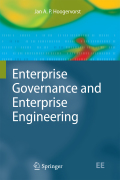
Achieving enterprise success necessitates addressing enterprises in ways thatmatch the complexity and dynamics of the modern enterprise environment. However, since the majority of enterprise strategic initiatives appear to fail – among which those regarding information technology – the currently often practiced approaches to strategy development and implementation seem more an obstaclethan an enabler for strategic enterprise success. Two themes underpin the fundamentally different views outlined in this book. First, the competence-based perspective on governance, whereby employees are viewed as the crucial core for effectively addressing the complex, dynamic and uncertain enterprise reality, as well as for successfully defining and operationalizing strategic choices.Second, enterprise engineering as the formal conceptual framework and methodology for arranging a unified and integrated enterprise design, which is a necessary condition for enterprise success. Unified rather than fragmented treatment of corporate, IT and enterprise governance Organismic rather than mechanistic approach to governance Design focus rather than a control focus for avoiding strategic failures Formal rather than unmethodical introduction of the IT and enterprise architecture concept based on viewing the enterprise as a socio-technical system INDICE: Part I: Basic Concepts.- 1) Introduction - 2) Mechanistic and Organismic Perspectives on Governance - 3) Enterprise Essentials - 4) System Thinking.- Part II: Governance Themes - 5) Corporate Governance - 6) IT Governance - 7) Enterprise Govenrance - 8) The Praxis Illustrated.
- ISBN: 978-3-540-92670-2
- Editorial: Springer
- Encuadernacion: Cartoné
- Páginas: 410
- Fecha Publicación: 01/02/2009
- Nº Volúmenes: 1
- Idioma: Inglés
